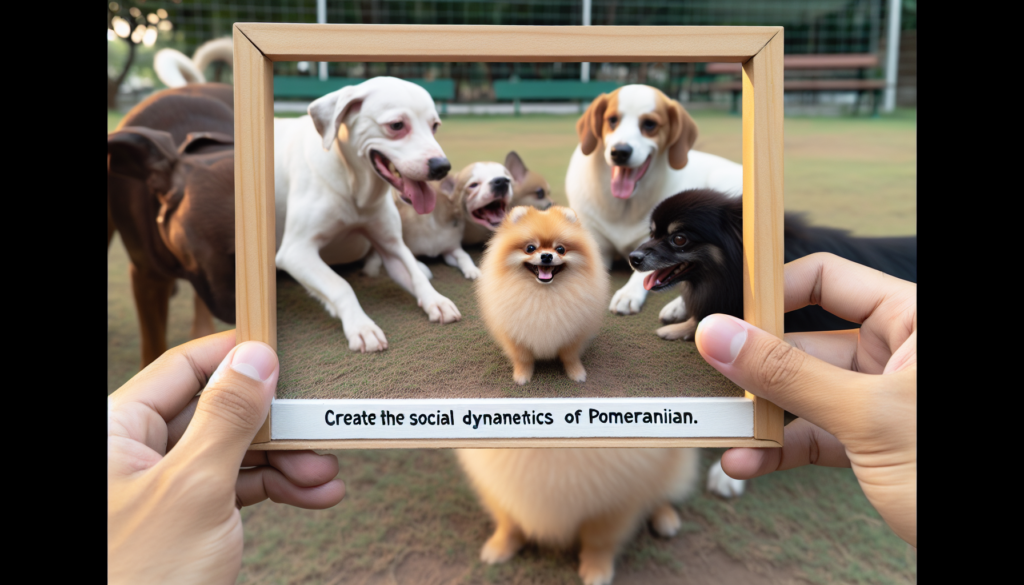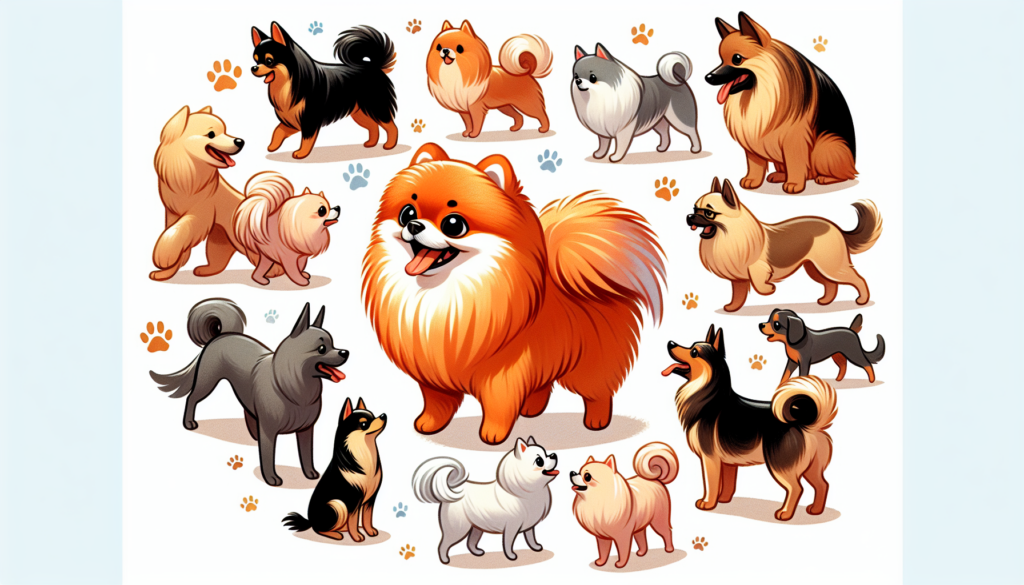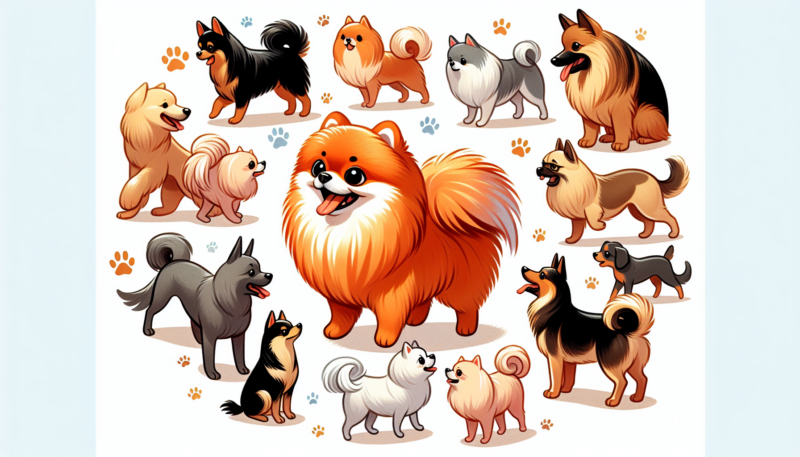If you’re considering adding a Pomeranian to your furry family, you may be wondering how well they get along with other dogs. With their fluffy coats and adorable faces, Pomeranians are undeniably charming creatures. However, it’s important to understand their compatibility with other dogs to ensure a smooth and harmonious dynamic within your home. In this article, we’ll explore whether Pomeranians have a natural affinity for their canine counterparts or if they tend to keep to themselves. So, whether you already have a dog and are considering adding a Pomeranian to the mix or simply curious about their social tendencies, read on to uncover the truth about Pomeranians and their compatibility with other dogs.
Pomeranians and Other Dogs
Pomeranians are adorable and lovable small dogs that are known for their vibrant personalities and fluffy coats. If you are considering getting a Pomeranian or already have one and are wondering about their compatibility with other dogs, this article will provide you with a comprehensive overview. Understanding the temperament of Pomeranians, the factors that affect their compatibility with different dog breeds, and tips for socializing them with other dogs will help you ensure a harmonious and happy multi-dog household.
Pomeranians: A Breed Overview
Pomeranians are a small dog breed that originated from the Pomerania region in Europe. Despite their tiny size, Pomeranians have big personalities. They are known to be energetic, curious, and often fearless. Pomeranians can have a strong prey drive and may exhibit protective behavior. While they make excellent companion dogs, their compatibility with other dogs varies depending on several factors.
Understanding Pomeranian Temperament
To understand the compatibility of Pomeranians with other dogs, it’s essential to delve into their temperament. Pomeranians are generally friendly and affectionate towards their owners. However, they can also be territorial and may display signs of jealousy. Their small size can sometimes lead to an assertive or aggressive attitude towards larger dogs, but this behavior can be managed through proper training and socialization.
Factors Affecting Pomeranian Compatibility with Other Dogs
Several factors can influence a Pomeranian’s compatibility with other dogs. One crucial factor to consider is their size. Pomeranians tend to get along well with dogs of similar or smaller size. The size difference can pose potential challenges when Pomeranians are introduced to large dog breeds. Additionally, the individual personalities of both the Pomeranian and the other dog can greatly impact their compatibility. Socialization, early experiences, and training also play a significant role in determining how well Pomeranians interact with other dogs.
Pomeranians and Small Dog Breeds
When it comes to small dog breeds, Pomeranians generally have a higher likelihood of compatibility. Their size similarity often makes it easier for them to engage in play and establish a rapport with other small dogs. However, proper introduction and socialization are still essential to ensure a positive and harmonious relationship between Pomeranians and other small dog breeds.
Pomeranians and Medium-Sized Dog Breeds
Pomeranians can also get along well with medium-sized dog breeds, provided the introduction is done with caution and both dogs are properly socialized. While size difference can sometimes pose initial challenges, with time and positive interactions, Pomeranians can develop a friendly relationship with medium-sized dogs.
Pomeranians and Large Dog Breeds
Introducing a Pomeranian to a large dog breed requires extra care and caution due to the potential size difference. Large dogs may unintentionally intimidate or harm a Pomeranian due to their significantly larger bodies. However, with gradual acclimation, proper training, and supervision, some Pomeranians can establish positive relationships even with large dog breeds.
Early Socialization for Pomeranians
Early socialization is crucial for Pomeranians to develop positive behavior towards other dogs. Introducing them to different people, environments, and dogs from a young age helps them become well-rounded and adaptable pets. By exposing Pomeranians to various situations, they learn how to interact appropriately, reducing the likelihood of compatibility issues with other dogs in the future.

Positive Experiences with Other Dogs
Ensuring that Pomeranians have positive experiences with other dogs is essential for their future compatibility. Encouraging supervised playdates, visits to dog parks, or participating in training classes with other dogs helps Pomeranians learn how to interact and behave in the presence of their canine counterparts. These positive experiences will have a significant impact on their ability to get along with other dogs.
Avoiding Negative Experiences with Other Dogs
Negative experiences can have a lasting impact on a Pomeranian’s attitude towards other dogs. It is important to avoid situations where a Pomeranian feels threatened or fearful. Allowing them to approach other dogs at their own pace and monitoring their reactions is crucial. If a negative encounter occurs, it’s essential to address the issue calmly and provide reassurance to your Pomeranian. With time and patience, negative experiences can be overcome.
Territorial Behavior in Pomeranians
Pomeranians are known for their territorial behavior, especially when it comes to their owners and living space. This behavior can sometimes lead to conflicts and compatibility issues with other dogs. To manage territorial behavior, it is important to establish clear boundaries and rules for your Pomeranian. Consistent training and positive reinforcement techniques can help minimize territorial aggression and promote a harmonious environment.
Pomeranians’ Proneness to Jealousy
Pomeranians are often quite affectionate with their owners and can be prone to jealousy. Introducing another dog into their territory or giving attention to other dogs may trigger feelings of jealousy in a Pomeranian. To address this, it is crucial to provide equal attention, love, and positive reinforcement to all dogs in your household. Ensuring that each dog feels valued and loved can help prevent jealousy and potential conflicts.
Training Issues and Leash Reactivity
Training issues, including leash reactivity, can impact a Pomeranian’s compatibility with other dogs. Leash reactivity occurs when a dog exhibits aggressive or fearful behavior while on a leash. Proper training, socialization, and positive reinforcement methods can help address and manage leash reactivity in Pomeranians. Seeking help from a professional dog trainer may be beneficial in handling training challenges effectively.
Supervised Dog-to-Dog Introductions
When introducing a Pomeranian to another dog, it is essential to supervise the initial interactions closely. This supervision allows you to observe their behavior, intervene if necessary, and ensure their safety. Gradually introduce the dogs to each other in a controlled environment, providing positive reinforcement and rewards for calm and positive interactions.
Neutral Territory for the Initial Meeting
When introducing a Pomeranian to a new dog, it is best to choose a neutral territory for the initial meeting. Avoid introducing them directly into your Pomeranian’s territory, as this may trigger territorial behavior and potential conflicts. A neutral environment reduces the chances of aggression and allows the dogs to establish a neutral ground before transitioning to familiar surroundings.

Gradual Acclimation to Other Dogs
To ensure a successful introduction and long-term compatibility, gradually acclimate your Pomeranian to other dogs. Start with short and supervised interactions, gradually increasing their exposure to other dogs over time. This gradual approach allows your Pomeranian to build confidence, develop positive associations, and establish strong bonds with other dogs in a safe and controlled manner.
Positive Signs of Compatibility
When introducing your Pomeranian to another dog, positive signs of compatibility include relaxed body language, friendly and playful interactions, and mutual interest in engaging with each other. If both dogs display calm behavior, show curiosity, a healthy level of excitement, and engage in positive play, it is a good indication of potential compatibility.
Red Flags and Warning Signs
It is important to be mindful of red flags and warning signs during dog-to-dog interactions. Aggressive posturing, growling, snapping, excessive barking, or any signs of fear or distress can indicate incompatibility and potential aggression. If any of these warning signs are present, it is crucial to separate the dogs and consult a professional for evaluation and guidance.
Consulting a Professional for Evaluation
If you are unsure about your Pomeranian’s compatibility with other dogs or encounter challenging behavior, consulting a professional dog trainer or behaviorist is highly recommended. These experts can assess the situation, provide guidance on training techniques, and offer strategies to address compatibility issues effectively. Their expertise will help ensure the best possible outcome for your Pomeranian and all dogs involved.
Establishing Clear Rules and Boundaries
To manage multiple dogs, including Pomeranians, it is important to establish clear rules and boundaries for all dogs in your household. Consistency is key in ensuring that each dog understands their place in the hierarchy and follows the house rules. By setting expectations and reinforcing positive behavior, you can create a harmonious and well-balanced multi-dog household.
Ensuring Sufficient Individual Attention
When managing multiple dogs, it is crucial to ensure that each dog receives sufficient individual attention. Pomeranians, in particular, thrive on human interaction and may require more attention than larger dogs. Spending quality one-on-one time with each dog helps foster a strong bond and reduces the likelihood of jealousy or insecurity.
Positive Reinforcement Training for All Dogs
Positive reinforcement training is an effective method for managing multiple dogs and promoting compatibility. Rewarding desirable behavior with treats, praise, playtime, and other forms of positive reinforcement encourages dogs to repeat those behaviors. By focusing on positive behaviors and rewarding them, you can create a harmonious environment where all dogs feel valued and appreciated.
Understanding Aggression in Dogs
Aggression in dogs can manifest due to various reasons, including fear, resource guarding, territoriality, or improper socialization. It is important to understand that aggression is a complex behavioral issue that requires professional intervention. If you notice signs of aggression in your Pomeranian towards other dogs, seeking the assistance of a qualified professional is essential for safe management and addressing the underlying causes.
Identifying Aggressive Behavior in Pomeranians
Pomeranians may display aggressive behavior towards other dogs if they feel threatened or fearful. Signs of aggression can include growling, baring teeth, snapping, lunging, or intense staring. It’s important to recognize these signs and take appropriate action to prevent potential conflicts. With early identification and professional guidance, aggressive behavior can be managed and potentially corrected.
Managing and Addressing Aggression
Managing and addressing aggression in Pomeranians requires a comprehensive approach. Working with a professional behaviorist or trainer who specializes in aggression is highly recommended. They will assess the situation, develop a behavior modification plan, and guide you through the process of managing and addressing your Pomeranian’s aggression towards other dogs.
Summary of Pomeranian Compatibility with Other Dogs
In conclusion, Pomeranians can get along with other dogs with proper socialization, training, and management. Their compatibility varies depending on factors such as size, individual personalities, and early experiences. By understanding their temperament, introducing them to other dogs in a controlled manner, and addressing any behavioral challenges, you can create a harmonious multi-dog household.
Factors to Consider for Successful Dog-to-Dog Interactions
When introducing your Pomeranian to other dogs, consider factors such as size compatibility, early socialization, positive experiences, and individual personalities. These factors greatly influence the success of dog-to-dog interactions and can help establish positive relationships between your Pomeranian and other dogs.
Creating a Harmonious Multi-Dog Household
To create a harmonious multi-dog household, it is important to establish clear rules and boundaries, ensure sufficient individual attention for each dog, and implement positive reinforcement training techniques. Managing aggression and addressing compatibility challenges will help foster a peaceful and happy environment for all dogs involved. Remember to seek professional guidance when needed and prioritize the well-being and happiness of your Pomeranian and all other dogs in your home.
